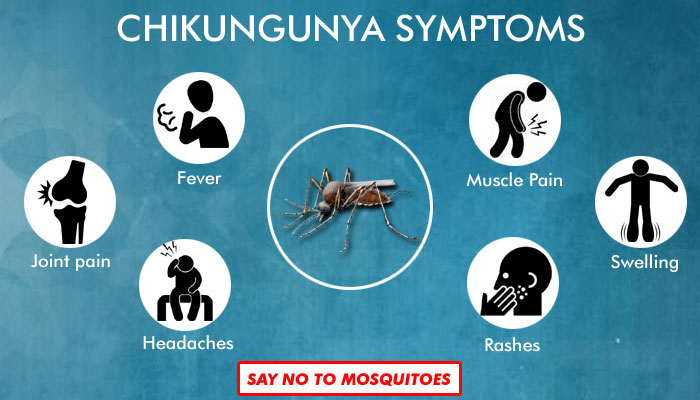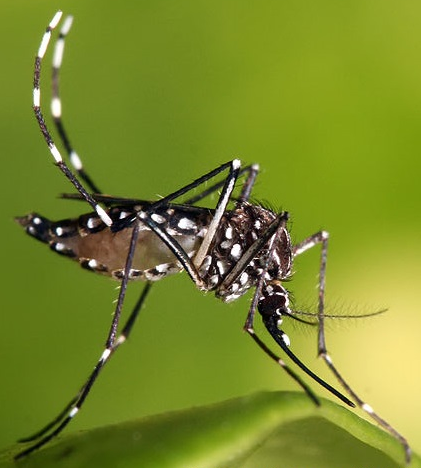
Chikungunya is a self-limiting viral disease caused by chikungunya virus which is transmitted to humans by an infected female Aedes aegypti, mosquitoes.
Chikungunya symptoms include fever and severe joint pain. Other commonly seen symptoms include muscle pain, headache, nausea, fatigue and skin rash. Joint pain is often debilitating involving all the joints; it varies in severity and duration. Patients with severe joint pain should be suspected to have chikungunya.
The clinical signs and presentation are similar to other viral infections especially dengue and can be misdiagnosed as dengue clinically. Dengue fever which can be diagnosed at the early stage of fever by laboratory tests should be done to rule out.
How does it affect our body?
The virus attacks the lining of the joints in the body and causes inflammation and pain, which can last from few weeks to years. But in most of the cases patients recover without any residual joint pain.
How is it Diagnosed??
Serological tests that detects IgM and IgG antibodies are used to confirm Chikungunya infection. The IgM antibody suggests recent infection, but they tend to peak after three weeks of infection and persist for about two months. So tests done for chikungunya in the early course of disease may show negative results. So it is advised to do these tests after four weeks of suspicion of chikungunya to get a correct report.
Virology tests to detect the virus early in the course of the disease can be done. These tests are very expensive and not routinely done unless there is very high suspicion or the disease is very severe.
 How does it spread?
How does it spread?
The virus is transmitted by a vector – female Aedes aegypti mosquito. When this mosquito bites a person suffering from chikungunya, the virus is drawn along with blood, and is transmitted to the next person whom it bites.
What is the incubation period after biting from an infected mosquito?
The incubation period usually varies between as less as two days to as long as 12days.
What is the treatment?
There is no specific treatment for chikungunya such as anti virals etc. The symptoms are managed with antipyretics such as paracetamol and patients are advised to take plenty of fluids to keep them hydrated. Severe joint pains are treated with strong anti-inflammatory medicines such as HCQS.
What are the complications of Chikungunya fever?
If left untreated, Chikungunya can lead to a series of complications including fever, weakness, severe joint pain. Although rare some patients may also have ophthalmic, neurological and cardiac complications. In some cases virus may not get cleared by the body causing lasting pain and damage to joints leading to deformity of joints.
Prevention
There is no vaccine available to prevent Chikungunya at present. Preventive measures are directed towards protecting oneself from mosquito bites and clearing the surroundings of mosquito breeding sites.
How does Chikungunia differ from other diseases like Dengue, thyroid, malaria and flu??
There is a severe backache in Dengue compared to Chikungunya.
Dengue fever can be detected very early during disease, as early as 1-2days, where as chikungunya antibodies are detectable only after three weeks of infection.
Typhoid is caused by bacteria salmonella typhi which infects the intestinal mucosa. The symptoms are similar, so it has to be confirmed with blood tests.
Malaria is caused by a parasitic protozoan belonging to Plasmodium family. It is also transmitted by mosquito bite. Malaria can also detect very early in the course of the disease, within 1-2days.
Flu is also a viral disease cause by various viruses which affect the respiratory system. Symptoms are more related to respiratory system, but there can be high-grade fever as well. Flu can be prevented by taking regular flu vaccine yearly.
Diet in chikungunya
First and foremost, encouraging increased fluid intake to the patient is necessary. Apart from plain water, the other fluids that can help in hydration and energy are glucose water, lemon water, coconut water, fruit juices, buttermilk etc. Freshly prepared vegetable soups can also benefit in increasing the hydration levels along with several nutrients.
Consumption of fruits and vegetables should be more so that enough vitamins and antioxidants are provided to the body to fight the infection.
It is important to follow a diet which is easy to digest, high in calorie and protein. Include meals at short intervals to gradually increase the calorie intake of the day.
A balanced diet should be followed. All the food groups can be consumed like cereals, pulses, fruits, vegetables, milk and milk products, egg and meats, nuts and oilseeds.
Fresh and proper cooked food should be consumed. It is not necessary that the food should be bland. Spices can be used in moderation to make food palatable to the patient. Variety should be kept so that it doesn’t become monotonous for the patient.
Foods to add to quicker recovery
- Vitamin A & C rich fruits and vegetables such as orange, lime, papaya, grapes, guava, pineapple, carrots, pumpkin, cabbage, sweet potato etc. should be consumed more frequently as they increase body’s immune system.
- Consumption of radish has proven in mucous reduction and headaches associated with it.
- Increasing the consumption of omega three fatty acids from sources like fish and seafood’s, flaxseeds etc. can help in reducing the inflammation.
Foods to be avoided.
- Avoid eating highly spicy and deep-fried food,
- Avoid caffeinated beverages,
- Avoid smoking
- Avoid alcohol
Home Remedies
- Take 1 cup water, add ½ tsp fennel seeds (saunf), ½ tsp cumin seeds (jeera) and ½ tsp caraway seeds (ajwain).Boil the mixture for 2-3 minutes and consume it after sieving. This will help to relieve the muscle and joint pains associated with chikungunya. It will also help in better digestion as well.
- Tulsi leaves can also benefit in strengthening immunity and reducing fever as well. You can either chew direct leaves or boil them some leaves in water and drink the concoction.
- Turmeric is also a proven antioxidant and possesses anti-inflammatory properties. Consuming ½ tsp of turmeric powder to 1 glass of milk can relieve chikungunya symptoms.
- Take 4-5 ginger slices and boil it in 1 ½ cup water. Drink this twice a day to relieve the pain.
About The Author
Dr. Siddharth.V.H– MBBS, M.Med Family Medicine (CMC Vellore ), RxDx.
Ms. Ratika Vinchurkar– MSc, Food & Nutrition, RxDx.



